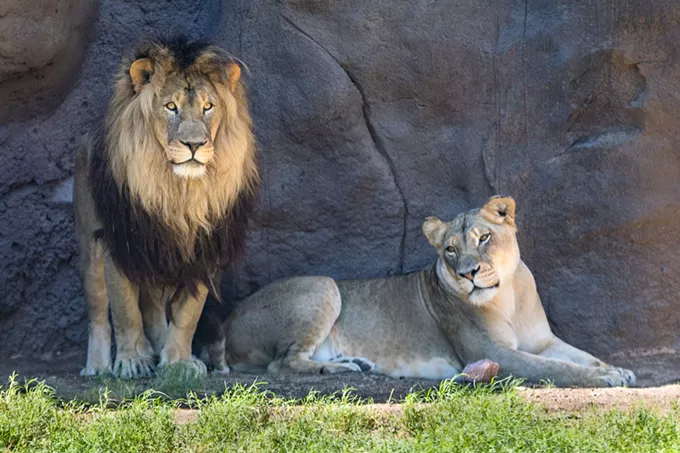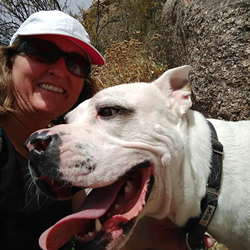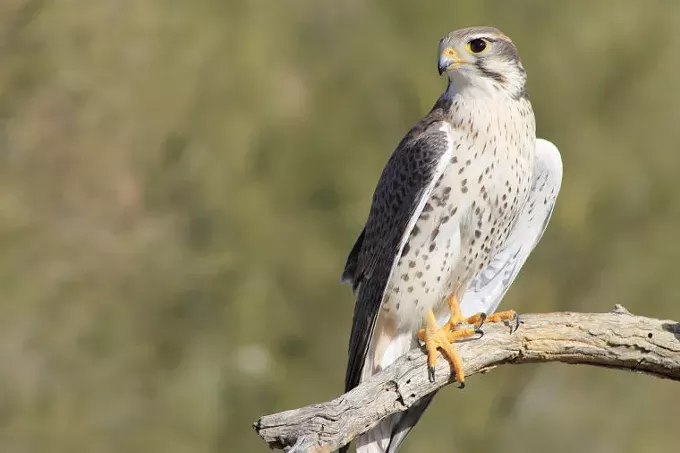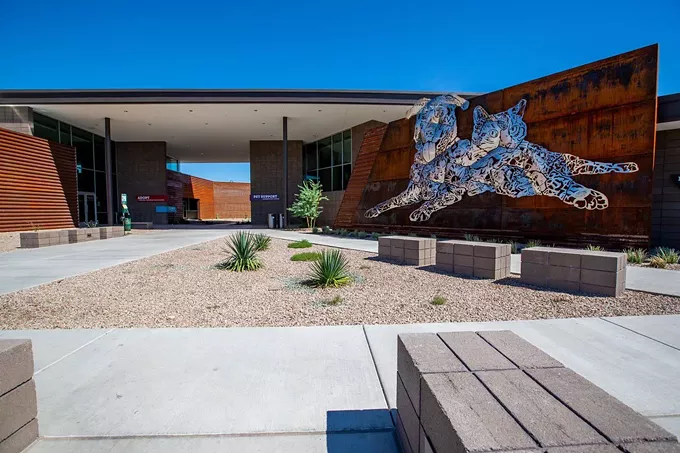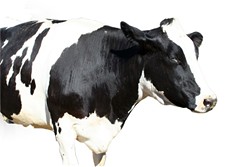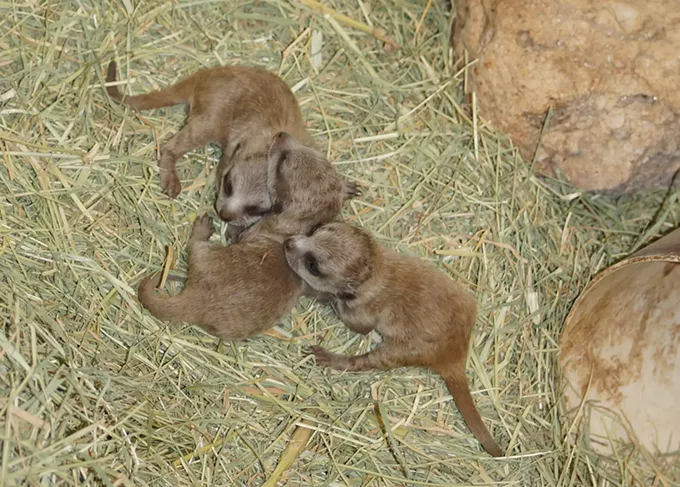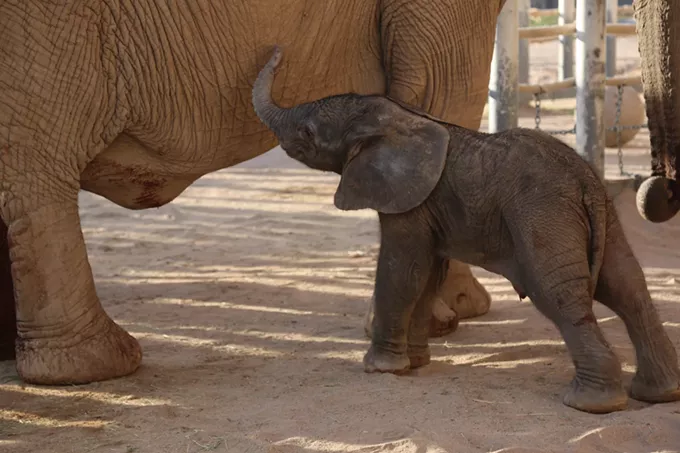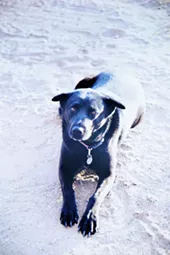Wednesday, June 24, 2020
“Losing Shombay is particularly difficult for our team,” said Dr. Sue Tygielski, Director of Zoo Operations, in the zoo’s announcement. “Our animal care and veterinary teams worked so hard to encourage him to participate in training sessions to help save his life. When he received these additional fluids, he would act more energetic. The team could see clear evidence of how their skills and dedication helped Shombay. They are all proud to have worked with him and our zoo is so lucky to have such dedicated staff.”
According to the zoo, the lion’s recent blood tests showed a decline in kidney function, and “he was not participating in fluid sessions.”
“These factors combined contributed to the zoo’s decision to humanely euthanize him on Wednesday morning,” the zoo stated.
Shombay landed at Reid Park Zoo in 2010, when he was 2 years old. Known as a cautious lion, Shomby was well known for investigating new habitats before making himself comfortable—and longtime patrons may remember the mohawk he once sported in his youth.
Shombay and Kaya, a female lion at the zoo, were responsible for the birth of several litters of cubs. Their 6-year-old, Nayo, lives at Reid Park.
“We expect their behaviors to be different in the near future as they adapt to life without Shombay,” Animal Care Supervisor Rebecca Edwards said. “Our team will do all we can to make the transition as easy as possible.”
Friday, June 19, 2020
Unfortunately, not all creatures get to share in the love and get left behind, forgotten about, or worse. If they're lucky, they make it to centers like Pima Animal Care Center where they sit and wait for their forever homes.
This can be super stressful for the animal, who only wants to feel safe and comfortable. Instead, they're crowded around other animals they don't know in conditions they're not familiar with, hoping that someone will notice them and take them in.
Enter people like Liz Johnson. Liz volunteers with PACC by fostering some of these animals until someone is willing to give them their home and heart. And now, she's being recognized for her efforts.
Friday, May 8, 2020
The association is a nonprofit organization “dedicated to the advancement of zoos and aquariums in the areas of conservation, animal welfare, education, science and recreation” and acts as the accrediting body for zoos and aquariums in the United States and 11 other countries.
The Arizona-Sonora Desert Museum was founded in 1952, and today contains more than 4,800 living animals spanning more than 240 species. The museum is also home to more than 56,000 plants of 1,200 taxa and an impressive mineral and fossil collection.
“I, the Board of Trustees, and all the staff and volunteers of the Arizona-Sonora Desert Museum are extremely pleased to hear that the Museum has, once again, earned accreditation through the Association of Zoos and Aquariums,” said museum executive director Craig Ivanyi, in a statement. “The AZA is the gold standard for the zoological industry and maintaining accreditation is critical to the credibility of the Museum and all its sister organizations, as we remain steadfastly focused on our critical conservation mission.”
Thursday, May 7, 2020
Pets living in a home facing financial hardship will benefit from the funding through the shelters assistance program.
“PACC now has an opportunity to help people and pets impacted by COVID,” said director Kristen Hassen. “We are here to help pets owned by people who have gotten sick or faced financial distress in this unprecedented event.”
Funding will provide aid for those facing hardship due to illness, job loss, financial insecurity or any other challenge related to COVID-19. Referrals for aid are made through the shelter’s partner groups, and PACC hopes to expand its pilot program as more funding becomes available.
During the pandemic, PACC is only allowing residents to enter the shelter by appointment. For more information, visit pima.gov/animalcare.
Tuesday, April 21, 2020
Arizona dairy farmers have taken part in this dumping process to help stay afloat. With demand for milk down from stay at home orders shutting down schools and restaurants, farmers are trying to reduce surpluses they can’t afford to produce and hold onto, while also maintaining prices for consumers. Cooperatives, including the United Dairymen of Arizona, have been working to help their farmers survive.
“We have about 12 million pounds of milk a day and we’re dumping about a million a day,” said Keith Murfield, CEO of the United Dairymen of Arizona.
The co-op is losing about $160,000 a day by dumping milk from approximately 70 member farms, Murfield said. The milk, however, is not being entirely wasted in the dumping process and is being run through digesters that convert it into such products as gas and electricity in some places. Other excess milk is fed to the cows and young livestock.
“You just can’t dump it on the ground, you got to be careful where you put it,” Murfield said.
Monday, April 20, 2020
The meerkats are the first-ever of the species born at the zoo and came only three days after the zoo announced the birth of a 295-pound African elephant calf.
“We are proud of our new little family and can’t wait for the pups to make their public debut,” said Nancy Kluge, president, and CEO of Reid Park Zoo, in a statement.
According to the zoo, meerkat pups are largely helpless for the first few weeks of life because they are born with both eyes shut ears and very little hair. Adults share child-rearing roles.
According to Animal Care Supervisor Adam Ramsey, all three adults, who are also first-time parents, are “doing an excellent job of parenting.”
“Both females are nursing, grooming and cuddling the babies to keep them warm,” Ramsey said.
The species arrived at the zoo in 2017 as part of a breeding recommendation in cooperation with the Association of Zoos and Aquariums. Meerkats are a member of the mongoose family and are found in the desert and grasslands of Africa.
Even though the zoo is closed to the public, you can still check in on the animals through virtual visits on the Reid Park Zoo’s social media accounts and at reidparkzoo.org.
Friday, April 10, 2020
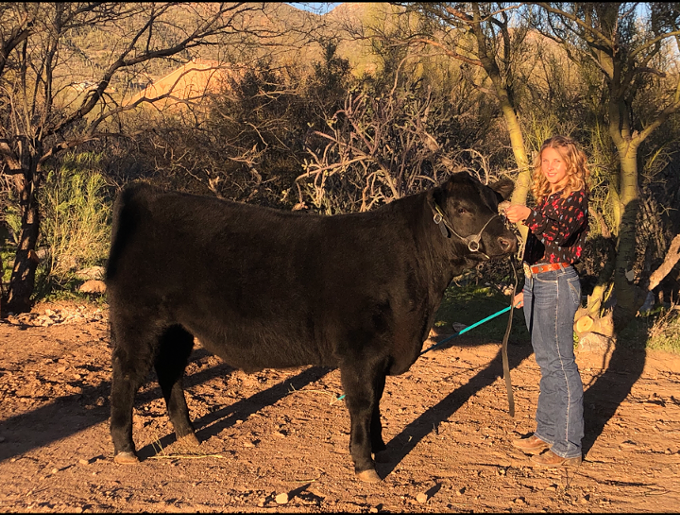
The Los Charros Foundation Inc. is purchasing $25,000 worth of small and large livestock from members of the two groups at this year’s online auction, hosted by the Pima County Junior Livestock Sales Inc. The foundation typically spends about $5,000 at Southern Arizona county fairs in Pima, Santa Cruz and Cochise counties, said board member Richard Bratt. After this year’s Pima County Fair was canceled Bratt said he knew the organization had to do more.
“This year, we’re reallocating $25,000 from our scholarship fund because these kids didn’t get to have the Pima County Fair where they could auction,” Bratt said. “These kids are getting hurt after spending all year and spending their own money buying feed and supplies.”
Bratt said he was concerned local 4-H and FFA youth would ultimately be losing money typically used for their higher education after recouping feed and supply cost accrued raising the animal.
“Some of these kids are selling a pig for $1,800 or a steer might go anywhere from $8,000 to $12,000. These kids might lose out on all that money,” Bratt said.
Tags: 4h , auction , online , future farmers , charity , Image
Monday, April 6, 2020
The female calf weighed 295 pounds at birth. The zoo said she is “healthy, standing and nursing.”
“Semba is an experienced mother,” said Dr. Sue Tygielski, Director of Zoological Operations, in the announcement. “After 22 long months of gestation, she had smooth labor without any complications. As African elephants continue to face increasing challenges in the wild, each birth contributes to the global population and sustainability of this vulnerable species. Today, the birth of this calf gives us cause for celebration at Reid Park Zoo, and it gives us optimism for the future.”
The new calf is the sixth member of Reid Park Zoo’s elephant herd and joins Semba, father Mabu, female Lungile, nine-year-old brother Sundzu and little sister Nandi, who turns six this summer. The calf is the second African elephant born at the zoo. Nandi was born in 2014.
The herd has already met their newest member and will take the next few days getting to know her.
“Semba is an excellent mom, and she has had close and nurturing interaction with the calf,” Tygielski said. “Elephant births are exciting but also a test of patience for staff and the elephant mom.”
The zoo began observing breeding behavior between Semba and Mabu in late spring of 2018 and soon found out the former was pregnant. The zoo crew has been on a 24-hour baby watch for the last seven weeks.
“This is a great day for Reid Park Zoo, and really, a beacon of hope,” said Nancy Kluge, Reid Park Zoological Society President, and CEO. “Coming during this challenging time in the world, this baby elephant is a symbol of the beauty and resilience of life for so many. We are just thrilled for Semba and the whole herd. We are grateful to our community for following Semba’s pregnancy, especially while the Zoo has been closed. We look forward to the day when we can welcome the public back to Reid Park Zoo to help us celebrate the joy of this new baby and our elephant herd.”
Check-in on the newest elephant in Tucson for yourself by following her webcam at reidparkzoo.org.
Tags: reid park , zoo , semba , elephant , baby , congrats , Image
Friday, April 3, 2020
That's exactly the message being put out by area shelters - Pima Animal Care Center, the Humane Society of Southern Arizona, and The Hermitage No-Kill Cat Shelter.
They suggest having a plan for an emergency (which isn't a bad idea to have whether there's a pandemic or not) so that your beloved pet doesn't end up in a shelter, scared and alone.
The following are the three biggest tips on how to have an Emergency Plan for your pets:
Tags: pets , animals , shelter , pacc , hssa , hermitage , cats , dogs , Image
Wednesday, April 1, 2020
In an effort to fill food bowls for those facing hardship, the Humane Society of Southern Arizona is hosting a pet food donation drive this Friday and Saturday. Donations go to the organization’s monthly distribution program.
If you’re looking to help out, donations of unopened food can be made from 9 a.m to 4 p.m. on Friday, April 3 and Saturday, April 4 at either the main campus (635 W. Roger Road) or the HSSA Thrift Store (5311 E. Speedway Blvd.)
Though the two facilities are accepting donations, the thrift store is closed during the pandemic, and the main campus is only open for appointments.
“At HSSA we are proud of the fact that we serve pets and the people who love them,” said HSSA CEO Steve Farley. “Now is the time for us to come together to help those in need. We hope you will join us in easing the burden of community members in crisis by keeping
their pets fed in the upcoming weeks.”
Aside from pet food donations, the Humane Society is also accepting monetary donations to help fund its operations. Donations can be made online at hssaz.org/donate.
Tags: humane society , hssa , donations , food , funding , covid19 , Image


